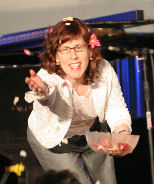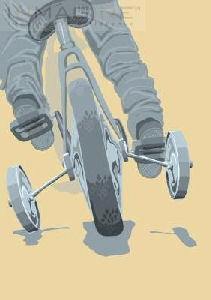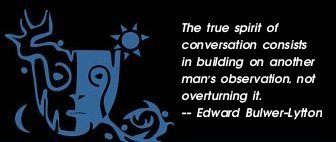|


Lean More Forcefully Into the Questions
by Honora Foah
Co-president & Creative Director
Mythic Imagination Institute
Gregory Macguire wrote Wicked: The Life and Times of the Wicked Witch of the West as a fairy tale for adults, with some trepidation about whether he would be able to be received beyond the 'children's' literature ghetto. Wicked has been quite a hit, made into a Broadway play, selling lots of books. Recently the New York Times interviewed MacQuire. Here's something he said: as a fairy tale for adults, with some trepidation about whether he would be able to be received beyond the 'children's' literature ghetto. Wicked has been quite a hit, made into a Broadway play, selling lots of books. Recently the New York Times interviewed MacQuire. Here's something he said:
-
-
"I didn't even realize this at first, but there's almost no central character in any of my 24 books who doesn't have a dead mother or a lost parent. When I hear Elphaba say, 'It's my fault,' that always seems to be the most moving part in the play. It has absolutely nothing to do with anything else. But there is, in the business of fairy tales, this idea that you are launched into the world with your mother's love. If you have a question about it, do you totter more than somebody else? Or do you walk more forcefully because you're questioning it and lean more forcefully into the questions that life provides?"
Man, I love that — lean more forcefully into the questions. Mr MacGuire's mother died from complications in giving birth to him. Like Cinderella, and so many others, he resembled his mother and his father could hardly stand to look at him. Wicked is a sympathetic story about Elphaba, the Wicked Witch of the West from L. Frank Baum's Wizard of Oz. There's a forceful question for ya — why is someone wicked?
I read another book a while back, Orson Scott Card's Speaker for the Dead . I loved that — a job, a calling, to speak for the soul's intention in life after that person has died. The Speaker would spend a year interviewing people and investigating the life of his charge. Then he would speak for that life. Since then, I've often had the desire to have that job. . I loved that — a job, a calling, to speak for the soul's intention in life after that person has died. The Speaker would spend a year interviewing people and investigating the life of his charge. Then he would speak for that life. Since then, I've often had the desire to have that job.
Once in a course I was taking with Cheryl Sanders-Sardello and Robert Sardello, we did this exercise about our parents. When we think about and talk about our parents, it is almost always in relation to ourselves. In this exercise, we were to imagine what our mother's and on another day, our father's, intention as a soul, was in this life. And then how it had gone for them. One of the great things about that exercise, was how in some lives, it was clear the child was rather peripheral to the meaning of the life. It isn't that one didn't have importance or impact, but the soul clearly had a reason for being that wasn't necessarily about the kid. Man, I loved that.
My mother died a year ago February. I miss her. In fact, despite competently doing Mythic Journeys, the Human Forum, and countless other projects, I think I have been crazy with grief the whole time. Absolutely crazy. I haven't been crying all the time, thinking about her all the time. I don't feel sentimental about the relationship, which was often difficult. But that woman loved me, and I think, I was kind of central to her life. Maybe too central. And I loved her, and there is something so particular about a mommy.
Today, this day, March 13th, I suddenly feel normal. I suddenly feel not crazy. I didn't realize exactly that I was crazy, but now that the blinding wail has stopped, I feel as if my head has been in a dark pail with shrieking banshees beating on it. And then today, for some reason, they stopped.
There is no escaping the enormous myth of the Mother, myth of the Father. One of the most terrible aspects of my relationship with my father is that, having had no father himself, he is unable to give any credence to the power his actions have and have had on his children. His refusal to acknowledge the mythic impact he has had is an amazingly painful negation.
 It is so fascinating. Does one lean more forcefully into the questions life poses, or not? Seems like leaning into the turns on a bike, knowing you're going to wobble and fall if you go too slow, forces the rider to get on with it. Some people get this great stable tricycle and some people are going to fall over if they go too slow. It is so fascinating. Does one lean more forcefully into the questions life poses, or not? Seems like leaning into the turns on a bike, knowing you're going to wobble and fall if you go too slow, forces the rider to get on with it. Some people get this great stable tricycle and some people are going to fall over if they go too slow.
Everything in me feels that as James Hillman says, the soul does indeed have a code and an intention that suggests, even demands, that we lean forcefully or gently into the questions our life has chosen to pose to us. So much of what we do, we would not have done if we knew how hard or painful it would be. That ignorance is a blessing that we engender when the force of our leaning in, or the no-wobble speed, prevents us from thinking too much or stopping too long.
Return to Passages Menu
Subscribe to the Passages e-newsletter
|

